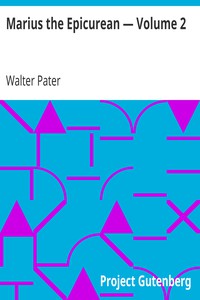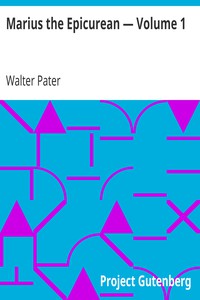Marius the Epicurean — Volume 2, Walter Pater [best romantic novels in english txt] 📗

- Author: Walter Pater
Book online «Marius the Epicurean — Volume 2, Walter Pater [best romantic novels in english txt] 📗». Author Walter Pater
—Let us leave Plato and the others at rest. It is not for me to contend against them. Let us rather search out together if the truth of Philosophy be as I say. Why summon the athletes, and archers from Persia?
—Yes! let them go, if you think them in the way. And now do you speak! You really look as if you had something wonderful to deliver.
—Well then, Lucian! to me it seems quite possible for one who has learned the doctrines of the Stoics only, to attain from those a knowledge of the truth, without proceeding to inquire into all the various tenets of the others. Look at the question in this way. If one told you that twice two make four, would it be necessary for you to go the whole round of the arithmeticians, to see whether any one of them will say that twice two make five, or seven? Would you not see at once that the man tells the truth?
—At once.
—Why then do you find it impossible that one who has fallen in with the Stoics only, in their enunciation of what is true, should adhere to them, and seek after no others; assured that four could never be five, even if fifty Platos, fifty Aristotles said so?
—You are beside the point, Hermotimus! You are likening open questions to principles universally received. Have you ever met any one who said that twice two make five, or seven?
—No! only a madman would say that.
—And have you ever met, on the other hand, a Stoic and an Epicurean who were agreed upon the beginning and the end, the principle and the final cause, of things? Never! Then your parallel is false. We are inquiring to which of the sects philosophic truth belongs, and you seize on it by anticipation, and assign it to the Stoics, alleging, what is by no means clear, that it is they for whom twice two make four. But the Epicureans, or the Platonists, might say that it is they, in truth, who make two and two equal four, while you make them five or seven. Is it not so, when you think virtue the only good, and the Epicureans pleasure; when you hold all things to be material, while the Platonists admit something immaterial? As I said, you resolve offhand, in favour of the Stoics, the very point which needs a critical decision. If it is clear beforehand that the Stoics alone make two and two equal four, then the others must hold their peace. But so long as that is the very point of debate, we must listen to all sects alike, or be well-assured that we shall seem but partial in our judgment.
—I think, Lucian! that you do not altogether understand my meaning. To make it clear, then, let us suppose that two men had entered a temple, of Aesculapius,—say! or Bacchus: and that afterwards one of the sacred vessels is found to be missing. And the two men must be searched to see which of them has hidden it under his garment. For it is certainly in the possession of one or the other of them. Well! if it be found on the first there will be no need to search the second; if it is not found on the first, then the other must have it; and again, there will be no need to search him.
—Yes! So let it be.
—And we too, Lucian! if we have found the holy vessel in possession of the Stoics, shall no longer have need to search other philosophers, having attained that we were seeking. Why trouble ourselves further?
—No need, if something had indeed been found, and you knew it to be that lost thing: if, at the least, you could recognise the sacred object when you saw it. But truly, as the matter now stands, not two persons only have entered the temple, one or the other of whom must needs have taken the golden cup, but a whole crowd of persons. And then, it is not clear what the lost object really is—cup, or flagon, or diadem; for one of the priests avers this, another that; they are not even in agreement as to its material: some will have it to be of brass, others of silver, or gold. It thus becomes necessary to search the garments of all persons who have entered the temple, if the lost vessel is to be recovered. And if you find a golden cup on the first of them, it will still be necessary to proceed in searching the garments of the others; for it is not certain that this cup really belonged to the temple. Might there not be many such golden vessels?—No! we must go on to every one of them, placing all that we find in the midst together, and then make our guess which of all those things may fairly be supposed to be the property of the god. For, again, this circumstance adds greatly to our difficulty, that without exception every one searched is found to have something upon him—cup, or flagon, or diadem, of brass, of silver, of gold: and still, all the while, it is not ascertained which of all these is the sacred thing. And you must still hesitate to pronounce any one of them guilty of the sacrilege—those objects may be their own lawful property: one cause of all this obscurity being, as I think, that there was no inscription on the lost cup, if cup it was. Had the name of the god, or even that of the donor, been upon it, at least we should have had less trouble, and having detected the inscription, should have ceased to trouble any one else by our search.
—I have nothing to reply to that.
—Hardly anything plausible. So that if we wish to find who it is has the sacred vessel, or who will be our best guide to Corinth, we must needs proceed to every one and examine him with the utmost care, stripping off his garment and considering him closely. Scarcely, even so, shall we come at the truth. And if we are to have a credible adviser regarding this question of philosophy—which of all philosophies one ought to follow—he alone who is acquainted with the dicta of every one of them can be such a guide: all others must be inadequate. I would give no credence to them if they lacked information as to one only. If somebody introduced a fair person and told us he was the fairest of all men, we should not believe that, unless we knew that he had seen all the people in the world. Fair he might be; but, fairest of all—none could know, unless he had seen all. And we too desire, not a fair one, but the fairest of all. Unless we find him, we shall think we have failed. It is no casual beauty that will content us; what we are seeking after is that supreme beauty which must of necessity be unique.
—What then is one to do, if the matter be really thus? Perhaps you know better than I. All I see is that very few of us would have time to examine all the various sects of philosophy in turn, even if we began in early life. I know not how it is; but though you seem to me to speak reasonably, yet (I must confess it) you have distressed me not a little by this exact exposition of yours. I was unlucky in coming out to-day, and in my falling in with you, who have thrown me into utter perplexity by your proof that the discovery of truth is impossible, just as I seemed to be on the point of attaining my hope.
—Blame your parents, my child, not me! Or rather, blame mother Nature herself, for giving us but seventy or eighty years instead of making us as long-lived as Tithonus. For my part, I have but led you from premise to conclusion.
—Nay! you are a mocker! I know not wherefore, but you have a grudge against philosophy; and it is your entertainment to make a jest of her lovers.
—Ah! Hermotimus! what the Truth may be, you philosophers may be able to tell better than I. But so much at least I know of her, that she is one by no means pleasant to those who hear her speak: in the matter of pleasantness, she is far surpassed by Falsehood: and Falsehood has the pleasanter countenance. She, nevertheless, being conscious of no alloy within, discourses with boldness to all men, who therefore have little love for her. See how angry you are now because I have stated the truth about certain things of which we are both alike enamoured—that they are hard to come by. It is as if you had fallen in love with a statue and hoped to win its favour, thinking it a human creature; and I, understanding it to be but an image of brass or stone, had shown you, as a friend, that your love was impossible, and thereupon you had conceived that I bore you some ill-will.
—But still, does it not follow from what you said, that we must renounce philosophy and pass our days in idleness?
—When did you hear me say that? I did but assert that if we are to seek after philosophy, whereas there are many ways professing to lead thereto, we must with much exactness distinguish them.
—Well, Lucian! that we must go to all the schools in turn, and test what they say, if we are to choose the right one, is perhaps reasonable; but surely ridiculous, unless we are to live as many years as the Phoenix, to be so lengthy in the trial of each; as if it were not possible to learn the whole by the part! They say that Pheidias, when he was shown one of the talons of a lion, computed the stature and age of the animal it belonged to, modelling a complete lion upon the standard of a single part of it. You too would recognise a human hand were the rest of the body concealed. Even so with the schools of philosophy:—the leading doctrines of each might be learned in an afternoon. That over-exactness of yours, which required so long a time, is by no means necessary for making the better choice.
—You are forcible, Hermotimus! with this theory of The Whole by the Part. Yet, methinks, I heard you but now propound the contrary. But tell me; would Pheidias when he saw the lion’s talon have known that it was a lion’s, if he had never seen the animal? Surely, the cause of his recognising the part was his knowledge of the whole. There is a way of choosing one’s philosophy even less troublesome than yours. Put the names of all the philosophers into an urn. Then call a little child, and let him draw the name of the philosopher





Comments (0)